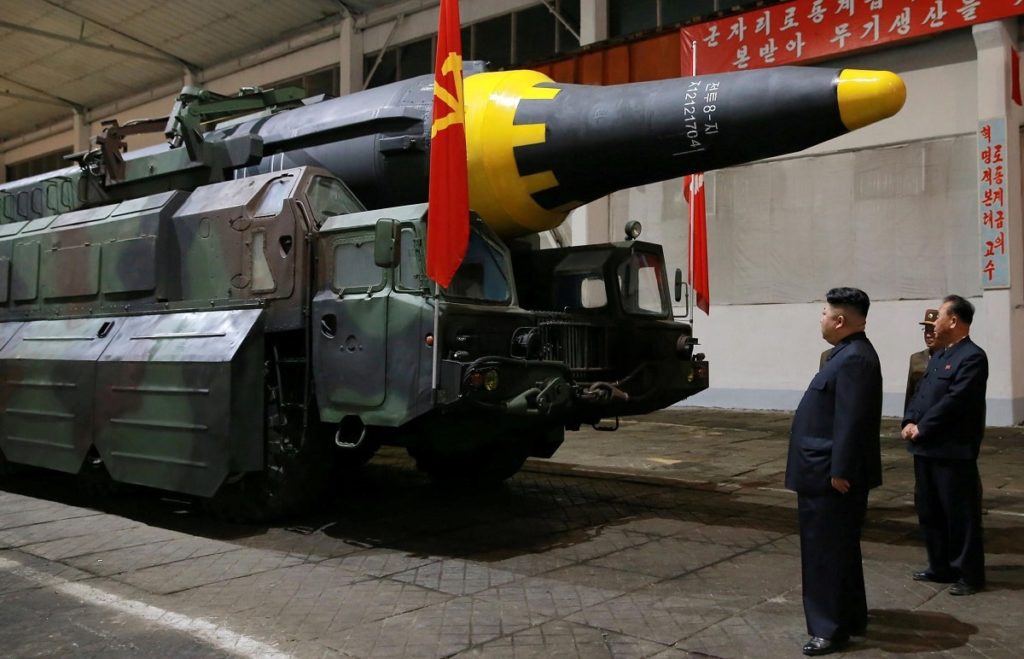This article was published by 1945.
On March 10, 2022, the U.S. released a South Korea and Japan coordinated assessment of the last two North Korean missiles launches in February and March revealing that these were tests of components of a new intercontinental ballistic missile (ICBM) system, with some reporting suggesting a full ICBM test is in the works. This may be a major inflection point for security on the Korean peninsula as well as North Korea’s ability to potentially attack the U.S. homeland. Despite Putin’s War raging in Ukraine, the U.S. and the international community must be prepared for the likely eventuality of at least an ICBM test if not also a possible nuclear test. To prepare courses of action policymakers and strategists must recognize and understand Kim Jong-un’s strategy.
Kim is facing severe domestic difficulties due to COVID mitigation measures, natural disasters, a failed economy due to poor central decision making by Kim Jong-un, and international sanctions. When faced with similar difficulties in the past, the regime has lashed out to “externalize” the threat and show the Korean people they must sacrifice to defend the regime from the hostile policies of the U.S. and South Korea. This could be one reason for the nine missile launches so far in 2022.
What is more likely is the recent actions of missile launches, new construction at the Pyunggye-ri nuclear test site, the regime’s announcement that it intends to launch satellites for reconnaissance purposes, and Kim’s visit to the Sohae launch facility are designed to support the dual focus regime strategy. The main effort is a political warfare strategy combined with blackmail diplomacy which uses tensions, threats, and provocations to gain political and economic concessions. The most important near-term concession for the regime is sanctions relief, at least partially. The second line of effort is development of advanced military and warfighting capabilities in support of the objective to ultimately dominate the Korean peninsula.
These two lines of effort are not divergent. They are mutually supporting and reinforcing –meaning they work in concert with each other – and are ultimately focused on ensuring the survival of the regime through peninsula domination. This has been ongoing over the past three decades. However, this time may be different. Although there are concerns about policy failure, the current situation may provide an opportunity to interrupt the cycle of provocations depending on decisions made by Kim Jong-un and the ROK/U.S. alliance.
Kim’s current actions may be based on his assessment of his relationship with former President Trump. Specifically, Trump touted his Korea policy as a success because his relationship with Kim caused him to implement a self-imposed moratorium on ICBM and nuclear tests after 2017. Despite some sixty missile and rocket launches from the failed Hanoi summit in 2019 until now, since there was not an ICBM or nuclear test Trump’s policy supposedly worked.

Kim may have assessed the U.S. political situation and determined that President Biden cannot afford a foreign policy challenge on the Korean peninsula. If he exerts enough pressure on the U.S. and the ROK he likely believes that at this point the ROK and U.S. will acquiesce and provide some form of sanctions relief in the hope that Kim Jong-un will allow negotiations to restart and not conduct any ICBM or nuclear tests.
To read more, please click here.
David Maxwell is a senior fellow at FDD. He is a 30-year veteran of the United States Army, retiring in 2011 as a Special Forces Colonel with his final assignment serving on the military faculty teaching national security strategy at the National War College.



